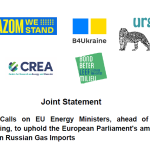As action in the next 10 years will be most decisive in limiting temperature rise to 1.5°C, the EU will need to increase its 2030 domestic greenhouse emission reduction target under the Paris Agreement (the EU’s NDC-Nationally Determined Contribution) from at least 40% to at least 65% compared to 1990 emissions.
CAN Europe regards the Paris Agreement’s goal to limit temperature rise to 1.5°C as the only acceptable goal for all policy making and planning aimed at averting dangerous climate change.
This position reflects the social and economic opportunities of the zero carbon transition and the growing evidence of extreme impacts of climate change.
CAN Europe translates its support for the 1.5°C objective into specific greenhouse gas emission reduction targets, using the illustrative pathways from the Intergovernment Panel on Climate Change (IPCC) Special Report on Global Warming of 1.5°C, and in particular those pathways that avoid temporary overshoot of the 1.5°C objective and which hence also rely least on unproven removal technologies to bring temperature back below 1.5°C in case of overshoot.
Furthermore, CAN Europe endorses the equity principle stating that countries with a higher historical responsibility and with greater capacity to act should do more and hence concludes that Europe should act much faster than most other countries in the world.
Based on science and equity to limit temperature rise to 1.5°C and thus fully implement the Paris Agreement, the EU would need to reduce its net greenhouse gas emissions to zero by 2040, by rapidly increasing the rate of emission reduction in all sectors of the economy, and by investing in biodiversity protection and as such increase the carbon removal capacity of natural ecosystems.
And most importantly, as action in the next 10 years will be most decisive in reaching the 1.5°C objective, the EU will need to increase its 2030 domestic greenhouse emission reduction target under the Paris Agreement (the EU’s NDC-Nationally Determined Contribution) from at least 40% to at least 65% compared to 1990 emissions.
On top of this domestic reduction effort, and in line with the principles of equity and fairness, the EU should increase its financial support to poor countries in line with its fair share of the climate finance commitments of rich countries.



